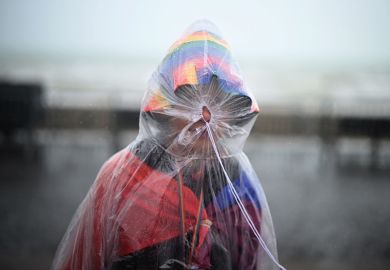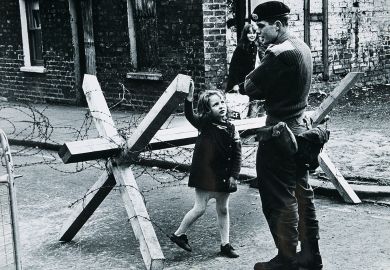This attempt to provide an overview of "the culture of the English people" from "Iron Age to the Industrial Revolution" has a curiously un-English feel, as an academic project, although in much of its execution it is quintessentially English in its attention to detail and its commonsensical approach. Perhaps this reflects what the author himself considers a typical "English ability to compromise, to refrain from pushing matters to an extreme", whereby an empiricist accumulation of examples, notably of material culture, is combined with an analytic framework drawn largely from the Annales school of the history of mentalites.
The most favoured English historian is Keith Thomas, but greater analytic reliance is placed on Robert Muchembled and Aron Gurevich (but not, significantly, Fernand Braudel). From such writers is drawn a model of popular culture as communitarian, local, deeply resistant to change and caught within a "magical" and non-scientific culture desperately seeking explanation and control of a threatening environment beyond human control. Yet the empirical account is largely one of gradual improvement both in productive methods and, especially, in material comforts, leading eventually to a modern society in which such a culture could no longer survive.
To suggest that this book is full of unresolved tensions is not to damn it: so is any attempt to grapple with a complex issue over a long period. But there is a stark contrast in the proficiency with which the author tackles the two sides of his story. As those familiar with £' earlier writings on material culture would expect, his chapters on housing, tools and other environmental features are full of perceptive observations and offer a valuable introduction.
The problem of doing justice both to regional variation and to chronological development is managed reasonably well, although there are some awkward repetitions; the medieval is always handled with more sureness and detail than the early modern.
The main weakness is that the presentation of changes in production, above all in agriculture, is cursory and draws little on the fundamental work of the Leicester school of agrarian and regional history: once again the focus is on the products that resulted from agriculture rather than the culture created by agricultural work and its economic rewards. The brief remarks on this theme are likely to confuse as much as enlighten, for example that "the yeoman class was particularly vulnerable in the later 16th and 17th centuries" and that their landless descendants, "workers on the land of the gentry and large farmers" were known as "husbandmen".
But it is when £moves beyond material culture to social relationships and values that his account becomes really problematic. The grasp of the recent historiography in these areas is weak and many superseded ideas are repeated. The chapter on sickness and death contains numerous dubious assertions about lack of medical provision and insensitivity to environmental conditions and no references to work on attitudes to death.
While interesting on locks, keys and house construction and their implications for insecurity of moveable property, the book's background comments on crime rely on only one recent authority, namely Hanawalt's medieval study, and no effort is made to identify changes over time: early modernists, and perhaps medievalists, may be surprised to find England characterised as a "lawless land" where "most men carried arms of some kind". However, we learn that a "high value was placed on children", making infanticide uncommon; a statement more plausible than the repeated assertions elsewhere that, given high mortality, parents cared little for children. As this last example suggests, the history of the family and education is another area where individual details from primary sources are combined with broad generalisations often not sustained by recent work. The reader, moreover, is not offered any sense of the controversies surrounding the interpretations offered. Many archaeologists would question Barry Cunliffe's reconstruction of life at Danebury, on which the chapter on pre-Roman Britain is based, while the term peasant is no longer a neutral word as applied to English social structure: source criticism is practised intermittently regarding the use of probate material, but no real sense is given of the conceptual problems and choices involved in attempting to recapture "the culture of the people".
Running throughout the volume is an alternative vocabulary to that of popular culture, one which promises to establish a much more fruitful dialogue between the developing patterns of material culture and the nature of social relations and values.
This is the notion of "traditional culture", which is often used merely as an elegant variation to popular culture, evoking a sense of a lost world, but which potentially redirects our attention towards the nature of cultural transmission (that is, by tradition), rather than the social inclusivity or exclusivity of cultural activity implied in the term popular. The notion of tradition is not itself without ambiguities and paradoxes, of course, but if these are critically faced, as they are for example in the work of E. P. Thompson (only cited once in this book), then they can throw great light on the whole subject. Here, however, we learn a considerable amount about changing practices and beliefs, but nothing about how these were brought about by specific occupational or social groups (let alone the role played by gender). Admittedly, the social history of work, technology and education, in the broadest sense, is not that well developed in this country, but there are enough pointers to have enabled a pioneering synthesis of how, for example, the nature of cooking and eating evolved. In such an account cultural conservatism would cease to describe an outcome, seen as an inevitable product of the "primitive" mind - one perhaps excusable in a risk-prone world but none the less irrational by modern standards - and instead characterise a process.
The only model of cultural formation and change offered in the book is that of diffusion and imitation. The elite, and perhaps urban society, developed new products and ideas and these gradually "trickled down", but often only superficially; the Roman period is presented as such an "interlude" before it disappeared to leave "the culture of Britain" a purely popular one.
Despite occasional references to "acculturation" or to puritan campaigns against popular customs, this diffusion is normally presented as unintentional, while there is no discussion of cultural resistance or appropriation of cultural forms. Popular culture was doomed because it was a purely local culture, whereas elite culture is national and generalised. This model leaves no scope either for the notion of changing agrarian regions nor for the suggestions of Langton and others that industrialisation promoted, rather than obliterated, regional difference. Except in some of the discussions of new material comforts, industrialisation appears in this volume only as a catastrophic precipitant of change destroying the traditional. Yet this obscures many vital issues, not least that of how far traditional culture has moulded English industrial experience: both in terms of a preference for tradition over innovation in industrial practice and in regional and class variations in responses to industrialisation. The past evoked in this book thus becomes, for the general reader, a relatively uncontroversial one, in itself, in its historical reconstruction, and in its relevance for today: we know more and are better off. For all its interest and its attractive presentation, this book conveys a message many cultural historians will wish to challenge: will they rise to the occasion?
Jonathan Barry is lecturer in history, University of Exeter.
BOOKS
The Culture of the English People:: Iron Age to the Industrial Revolution
Author - N.J.G. Pounds
ISBN - 0 521 45099 3 and 46671 7
Publisher - Cambridge University Press
Price - £50.00 and £17.95
Pages - 500pp
Register to continue
Why register?
- Registration is free and only takes a moment
- Once registered, you can read 3 articles a month
- Sign up for our newsletter
Subscribe
Or subscribe for unlimited access to:
- Unlimited access to news, views, insights & reviews
- Digital editions
- Digital access to THE’s university and college rankings analysis
Already registered or a current subscriber? Login



